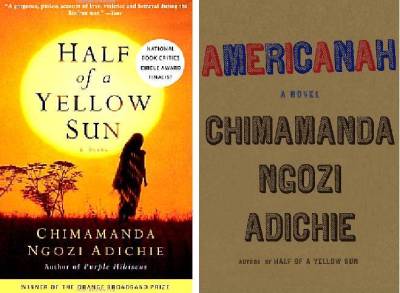An exploration of cultural differences between the USA and Nigeria
Last year I read Half of a Yellow Sun by Chimananda Ngozi Adiche. It was well-written and engaging, and informative about a part of the world I knew little of: Nigeria and the Nigerian Civil War.
More recently I viewed her interview (in English), along with other authors, on the Swedish Television program Babel. She was elegant and straight-forward in her responses to the moderator about her most recent book, Americanah, which I had yet to read. I have now read it, and I can recommend it to you, but…
As the title of this review suggests, Americanah was more than a story, the love story that it begins and ends with. It is not unusual to have the “top story” carry us along while the “bottom story” develops and eventually merges with or supersedes the top story.
In this case I felt the love story had much less weight than the other two messages and, therefore, made the totality of the book seem out of balance.
Other, smaller, problems I had in reading the book included that there were many Nigerian and other African person and place names unfamiliar to me and I had trouble remembering them. Also, during some of the many conversations between characters I lost track of which character was speaking.
A larger criticism of the book may be discerned by my comparing one passage (where someone reads a two-page blog article to a group of friends who were in party mode) with the lengthy radio address wherein John Galt holds forth in Ayn Rand’s Atlas Shrugged. If the book had not been assigned by my book circle, I would have quit the story here, at page 325 (of 477).
However, I’m glad I continued. The author has much to say beyond the relatively tepid love story (by itself it might have seemed less tepid). We learn the important differences in other- and self-perceptions between black people born in America and those born in Nigeria (and other African countries), and with those black people born in other parts of the world, such as Jamaica, but living in the USA. These are important things to know for Americans and Europeans of any “color” or racial identification. The problem for me is that she bangs the drum very hard and for too long. I get it, Ms Adichie.
There is one story within the book about the awfulness of being an African trying to get residence or asylum in Great Britain. This was pointed out by a fellow book circle member as the passage closest to earth and the most compelling. In contrast, the characters in the North Eastern USA where most of the non-Nigerian action takes place, are generally hyper-educated and effete, in my view.
There are non-trivial passages showing us the problems of “Negro hair,” primarily for women. I have been made more alert to this issue due to my daughter-in-law having such problems with such hair.
A troubling glimpse into the some of the politics presented in the novel shows that these educated people, of any color, were enthusiastic about the USA electing a “black” person as president. The Americans depicted expressed their intention to vote for him for this reason above all others. While I think I can understand the feelings of racial pride and the feeling of Black Americans that “it’s about time,” I have trouble accepting that this should be the main criterion for electing someone. The author, through her main character, seems to be very much all right with this.
The author was clever in using the main character’s blog as a credible source for background and for lectures on race and related topics.
A poignant observation in the book accompanies the fact that the main character, from Nigeria, was many years in the USA and decided to return to her country. She had changed and Nigeria had changed. She really belonged in neither country, as others who had similarly returned discovered. The former expatriates were expatriates in their own country, and so tended to associate with each other where and when they could.
It is a legitimate but sad ending to learn that you can’t go home again.



January 10, 2014 at 8:25 pm
As Cormac McCarthy writes in Cities of the Plain in the Border Trilogy,
“You go back home and everything you wished was different is still the same, and everything you wished was the same is different”.
LikeLike